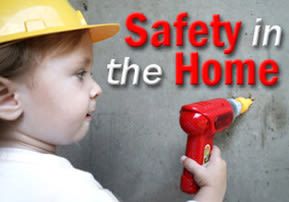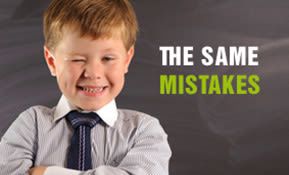
Safety in the Home
Studies indicate that the majority of home accidents involve electricity, fire, water, poisonous substances or falls. The more aware we are of the...

Studies indicate that the majority of home accidents involve electricity, fire, water, poisonous substances or falls. The more aware we are of the various causes of accidents, the more we can avoid them.
Electricity
There must be a rule that “Children do not touch sockets”. Parents must ensure that sockets not in use are covered, preferably with childproof covers. Do not leave sockets that have become detached from the wall, or exposed wires. It is dangerous to leave long electrical or phone wires trailing across the floor.
As far as possible, electrical appliances should be kept out of children’s reach. When this is impossible, we must make it clear to the children that they are not allowed to touch them. In teaching children about the dangers of electricity, parents should put particular emphasis on the serious danger if water comes in contact with electrical sockets, wires and appliances. Together with the explanations, parents must continue carefully supervising their children.
It is desirable to install an electrical safety switch that automatically shuts off the electricity supply when an appliance is faulty or in contact with water, etc.
Fire
We must take special precautions and do everything possible to avoid anything that might lead to a fire in the home. Too many appliances should not be attached to a single outlet. An appliance that emits a bad smell or smoke should be turned off immediately. Lamps, heaters and other appliances must be kept away from bedding, curtains and other fabrics. Some synthetic fabrics are particularly flammable and must be kept well away from flames. Fire and electrical heaters must be properly covered with safety-grills and children must be warned not to come near them or to stick anything into the heater.
A burning fire (food cooking on the stove, lighted candles) should not be left without supervision. Thank God, as Jews we have many opportunities to light candles in our homes on Shabbat, festivals and other occasions. We must see that the candles are always well out or children’s reach, and we must warn our children not to come near fire, and even then, we must keep careful watch over them. Special care must be taken when lighting candles in the Succah.
Many children are fascinated by fire, and there are some children who despite their fear will not pass up an opportunity to play with fire. We must warn children again and again that fire can cause a terrible disaster. Children must not be left unsupervised near a fire or flame of any kind, nor should children have access to matches and lighters, etc. Special supervision of children is necessary when lighting bonfires on Lag BaOmer, burning Hametz before Pesach or having a “Kumzitz” or barbecue. At Purim time children should not be allowed to play with dangerous fireworks, fire crackers and the like.
Water
Cases of children drowning in water in the home are all too common, and we must take extra precautions to avoid such accidents. When little children are around, it is dangerous to leave buckets of water around in the bathroom etc. unless the children are properly supervised, as they must be when playing in a tub or pool of water. Even when the water is very shallow, there is always the danger that a small child may fall with his face in the water. There is also a danger that a child may fall head first into the toilet or bath. The doors of the toilet and bathroom should be kept closed to prevent children entering. Small children must not be left in the bath unsupervised if there is the possibility that they could open a hot tap. One should always check the temperature of the bath or shower before putting a child in the water. Likewise the temperature of the child’s bottle must be checked before feeding.
Poisonous and other dangerous substances
All cleaning fluids, medicines, alcohol, paint, pest control substances and all other poisonous and dangerous substances must be kept out of reach of children and where possible locked away. Children must be warned repeatedly not to touch these substances, let alone putting them in their mouths.
Plastic bags are made of materials through which it is impossible to breathe. Children have a tendency to play with plastic bags and sometimes put them over their heads, which can cause suffocation. Plastic bags should be kept out of reach of children, and they must be taught never to put a plastic bag over their faces or heads.
Slipping and falling
Little children generally have little awareness of danger. We must teach them that it can be dangerous to climb on furniture or anything else that is not stable, and that if they have climbed somewhere and cannot get down, it is best to ask for help and not to jump. At the same time, parents should do what they can around the house to minimize the possibility of children’s slipping, falling and getting hurt.
When applying “polish” to the floor, one should choose a non-slip product. Especially when children are around, a polished floor should not be covered with rugs and carpets that might cause them to slip or trip. All obstacles should be removed from passageways, stairs and the like. are liable to slip and cause children to trip. Corners of items of furniture (tables, beds), marble kitchen surfaces, etc. should be rounded or padded to avoid injuries. Proper lighting helps avoid accidents.
Those who live on upper floors should see that windows have proper safety bars and that the railings around balconies and roofs are high enough and strong enough. Children must be taught never to climb on chairs or anything else near the railings. As soon as a child is old enough to crawl around the house, the door leading to the stairs must be kept closed. Duplex homes should have safety-gates at the top and bottom of the stairs.
In the kitchen
Small children and especially crawling babies should as far as possible be kept well away from the stove and oven. Check that the gas is shut when not in use. If there is a smell of gas, try to check the source. If there is a leak, close the safety tap and call a technician as soon as possible. When lighting the gas, a lighter with a long handle is preferable to matches.
When cooking with pots that have long handles, the pots should be arranged on the stove so that the handles do not stick out so that there is no danger of catching on them when passing by and pulling them over. Some stoves have a guard that prevents pots from moving or slipping out of place. When baking, be sure to keep children well away from the oven before opening the door.
Utensils containing hot food and liquids should not be left within reach of children. Nor should they be left on a table if there is any possibility that a child could pull at the tablecloth.
Knives, scissors and other sharp utensils must be kept out of small children’s reach, and the same applies to tools. Electrical appliances that are not in use should be disconnected and the outlet covered. Strong or poisonous substances should not be stored in the kitchen. The garbage bin should be kept covered.
In the bathroom
It is best to keep electrical outlets and switches out of the bathroom itself to avoid the possibility of contact with water. If there is an electrical heater in the bathroom, it must be mounted high up on the wall. Any electrical switches and outlets in the bathroom must be out of children’s reach. When bathing or showering, any electrical appliance that could possibly come in contact with water should be turned off.
It is advisable to attach non-skid strips to the bottom of the bath to prevent slipping. As elsewhere in the home, sharp instruments and strong or poisonous substances in the bathroom should be kept well out of reach of children.
The bedroom
Chose only a safe method of heating the children’s room, such as a radiator that has no exposed fire and cannot emit dangerous gases. In any event, the heater and all other electrical appliances must be kept well away from curtains, bedding and other fabrics.
A child’s crib should have side-rails that are sufficiently high to prevent any possibility that the child might climb out and fall. Crib slats should not be too wide apart so that the child will not be able to push his head in between and get caught. Soft pillows and bedding and anything else that could suffocate the baby must be removed. Ribbons, strings, straps and anything else that could cause strangulation must be kept well out of the child’s reach.
As a general rule toys for children of all ages should be chosen with an eye for their safety. Toys for babies should not be breakable or easily torn and should not have attachments that can be pulled off. Small toys should be kept well away from babies as they can put them in the mouth and swallow them. Make sure that all toys and other products for use with babies and children should meet the necessary official safety standards.
To be continued.
(With permission from www.azamra.org)













Tell us what you think!
Thank you for your comment!
It will be published after approval by the Editor.